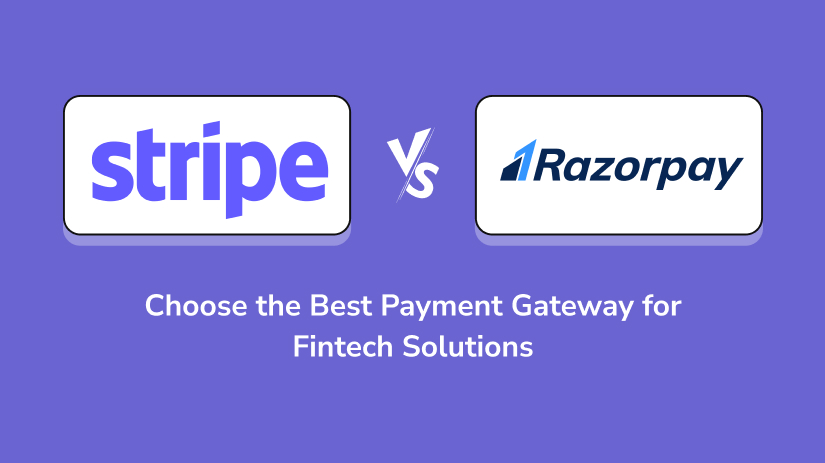In today’s rapidly evolving fintech landscape, selecting the right payment gateway and payment software solutions is crucial for the success of any financial service. Two prominent players in this space are Stripe and Razorpay.
Both offer comprehensive payment software solutions tailored for different markets and use cases. In this blog, we will compare Stripe vs Razorpay, exploring their features, integrations, and suitability for various fintech solutions.
Overview of Stripe
Stripe is a global leader in the payment processing industry, known for its robust and scalable solutions. Established in 2010, Stripe has grown into a major fintech company, offering a suite of financial services designed to cater to businesses of all sizes.
Key Features of Stripe
Global Reach
Stripe payment services are available in over 40 countries, supporting multiple currencies and payment methods.
Developer-Friendly
Stripe API payment integration is highly praised for its simplicity and extensive documentation, making it a preferred choice for developers.
Comprehensive Services
Beyond payment processing, Stripe offers financial services such as billing, invoicing, and even issuing physical and virtual cards.
Security and Compliance
Stripe ensures high-level security and compliance with PCI standards, which is crucial for maintaining trust in financial transactions.
The stripe fintech company has positioned itself as a go-to solution for businesses aiming for international expansion due to its extensive global network and versatile payment solutions.
Overview of Razorpay
Razorpay, founded in 2014, has quickly become a significant player in the Indian fintech space. The company provides a range of payment solutions tailored to the unique needs of the Indian market.
Connect with us for Fintech Development Needs
Trusted by companies like Plaid, Yodlee, Codat.
Key Features of Razorpay
Local Expertise
Razorpay payment gateway offers tailored solutions for the Indian market, including support for local payment methods like UPI, Netbanking, and wallets.
Seamless Integration
Razorpay payment gateway integration is straightforward, with SDKs and plugins available for various platforms.
Suite of Services
Razorpay goes beyond payment processing by offering services like payroll management, working capital loans, and subscription billing.
Developer Support
Razorpay integration is developer-friendly, with extensive API documentation and support.
Razorpay has carved a niche for itself in India by understanding and addressing the local payment needs effectively, making it a strong contender in the domestic market.
Connect with us for Fintech Development Needs
Trusted by companies like Plaid, Yodlee, Codat.
Stripe vs Razorpay: Integration and Ease of Use
When comparing Stripe vs Razorpay in terms of integration and ease of use, both platforms offer robust APIs and extensive documentation, making them developer-friendly.
Stripe Integration
Stripe API payment integration is known for its simplicity and flexibility. Fintech Developers can integrate Stripe into their systems with minimal effort, thanks to well-documented APIs and a range of SDKs. Stripe’s dashboard is user-friendly, providing a seamless experience for managing payments, refunds, and customer data.
Razorpay Integration
Razorpay payment gateway integration is equally straightforward, offering SDKs and plugins for popular platforms like WordPress, Magento, and Shopify. Razorpay’s documentation is comprehensive, ensuring that developers can integrate its services with ease.
The Razorpay dashboard provides detailed analytics and insights, which are invaluable for business decision-making.
Stripe vs Razorpay: Pricing and Fees
Pricing is a critical factor when choosing a payment gateway.
Let’s compare the fee structures of Stripe vs Razorpay:
Stripe Pricing
Stripe charges a standard fee of 2.9% + 30¢ per successful card charge. For businesses processing large volumes, custom pricing plans are available. Additionally, Stripe offers transparent pricing with no hidden fees, which is beneficial for financial planning.
Razorpay Pricing
Razorpay charges 2% per transaction for domestic cards, net banking, and wallets, while international cards incur a fee of 3%. Razorpay also offers custom pricing for high-volume businesses. Its competitive pricing structure makes it an attractive option for small and medium-sized enterprises in India.
Connect with us for Fintech Development Needs
Trusted by companies like Plaid, Yodlee, Codat.
Stripe vs Razorpay: Customer Support and Service
Reliable customer support is essential for resolving issues promptly and ensuring smooth operations.
Here’s how Stripe and Razorpay compare in this aspect:
Stripe Support
Stripe offers 24/7 customer support through various channels, including email, chat, and phone. The company also provides a comprehensive knowledge base and community forums, allowing users to find solutions quickly.
Razorpay Support
Razorpay provides 24/7 support via email and chat. The company also has an extensive help center with detailed guides and FAQs. Razorpay’s focus on local support ensures that users receive assistance tailored to their specific needs.
Stripe vs Razorpay: Suitability for Fintech Developments
When it comes to fintech software development, both Stripe and Razorpay offer valuable features and services.
However, their suitability depends on the target market and specific requirements.
Stripe for Global Fintech Solutions
Stripe fintech company excels in providing payment software solutions for businesses with a global reach. Its extensive range of services, including subscription billing, invoicing, and financial management, make it ideal for international fintech software development agencies.
Stripe’s scalability and reliability are unmatched, making it a preferred choice for large enterprises and startups alike.
Razorpay for Indian Fintech Solutions
Razorpay is tailored for the Indian market, making it the best choice for businesses operating in India. Its support for local payment methods and comprehensive suite of services, such as payroll management and working capital loans, address the unique needs of Indian businesses.
Razorpay’s competitive pricing and seamless integration options make it an excellent choice for small and medium-sized enterprises looking to leverage fintech developments.
Wrap-up words for Stripe vs Razorpay Evaluation
In the debate of Stripe vs Razorpay, the best choice depends on your business needs and target market. Stripe is ideal for businesses looking for a global payment gateway with extensive financial services and developer-friendly APIs. Its scalability and comprehensive features make it a strong contender for international fintech software solutions.
On the other hand, Razorpay is perfect for businesses focusing on the Indian market. Its local expertise, support for various Indian payment methods, and additional services like payroll and loans make it a well-rounded choice for domestic fintech developments.
Ultimately, both Stripe and Razorpay offer robust payment solutions that can cater to a wide range of business requirements. By understanding your specific needs and market focus, you can choose the payment gateway that best aligns with your business goals and ensures seamless financial transactions.
Happy Stripe & Razorpay Integration!!!
Connect with us for Fintech Development Needs
Trusted by companies like Plaid, Yodlee, Codat.





